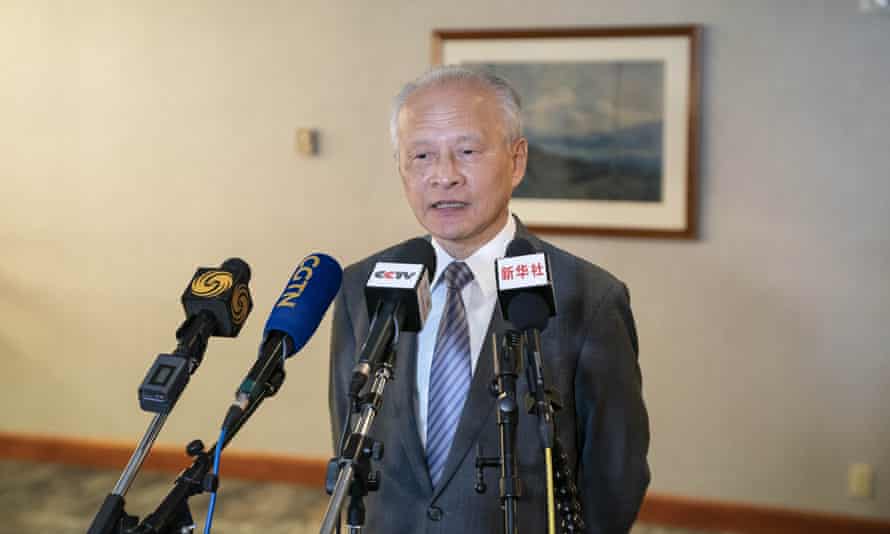Longest-serving envoy Cui Tiankai says relations between the countries ‘at a crossroads’

China’s ambassador to the US, Cui Tiankai, has announced he will leave Washington after eight years, saying US-China relations are at a “crossroads” as the US recalibrates its engagement policies.
Cui, whose departure has been the subject of speculation for months, wrote a farewell statement calling on Chinese people in the US to defend their right to be there, and to “shoulder a great responsibility and mission” in furthering the bilateral relationship.
“Sino-US relations are at a critical crossroads, and the US’s China policy is undergoing a new round of restructure, facing a choice between dialogue and cooperation, or confrontation and conflict,” he said in his letter.
“At this moment, overseas Chinese in the United States shoulder a greater responsibility and mission. I hope you will continue to be a firm promoter and positive contributor to the healthy and stable development of Sino-US relations, and defend your right to be in the US … and safeguard the fundamental interests of the Chinese and American people to promote world peace, stability and prosperity.”
Cui is China’s longest-serving ambassador to the US, and was there during a period of upheaval in relations between the two countries under the leadership of Xi Jinping and Donald Trump, including a trade war, tit-for-tat closures of consulates and restrictions on respective foreign journalists, criticism over China’s human rights abuses, worsening tensions over Taiwan, and hostility about the origins and handling of the pandemic.
The Biden administration has committed to continue some of Trump’s trade policies towards China, but has sought further cooperation on issues such as climate change, and has courted international alliances in other areas of dispute, in contrast to Trump’s unilateral stance.
Amid increasingly public hostility from China’s “wolf warrior” diplomats, Cui was considered a far more measured and moderate voice, including publicly resisting attempts by diplomatic colleagues to push conspiracy theories that the coronavirus began in the US military. However, Cui has pushed back against criticism of China’s hostile actions, and blamed “fake news” for reports on crackdowns in Hong Kong and abuses in Xinjiang.
Reporting in recent months suggested the 68-year-old had been deliberately kept in the post to manage relations during the transition into the Biden administration.
“Cui was getting very tired and had been wanting to leave for some years,” J Michael Cole said, citing diplomatic sources in Washington.
“He leaves at a time when US-China relations are at their lowest point in several years, if not decades. The principal reason for this is not his doing, as he was, by current standards, a rather mild-tempered representative of China abroad.”
Qin Gang, the vice-minister of foreign affairs under the foreign minister Wang Yi, is widely tipped to replace Cui. Cole said the appointment was interesting in that Qin has no direct experience in dealing with the US, but added that under the level of control by the Chinese regime there is likely little room for diplomats to manoeuvre.
“You could send the most experienced diplomat to Washington and still the relationship would continue to worsen,” he said.
Cole said recent remarks by China’s ambassador to France, Lu Shaye, publicly insulting French legislators and academics, suggest that most public moves by diplomats are aimed at domestic Chinese audiences more than where they are posted.
“If that is the case, and if Qin, should he be appointed, fits that mould, then we could see more rhetorical sparks in Washington than we did during Cui.”
